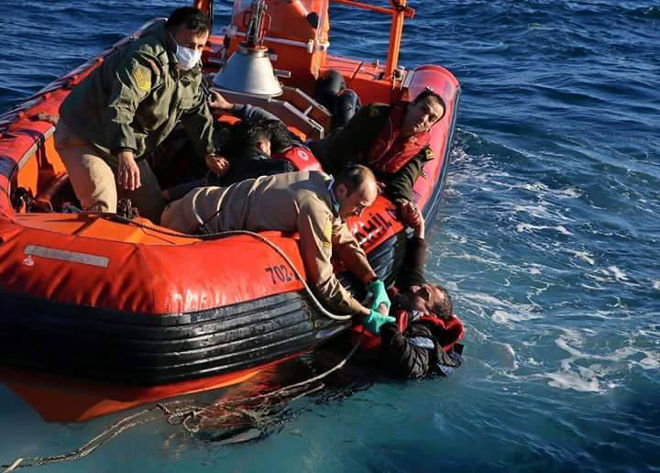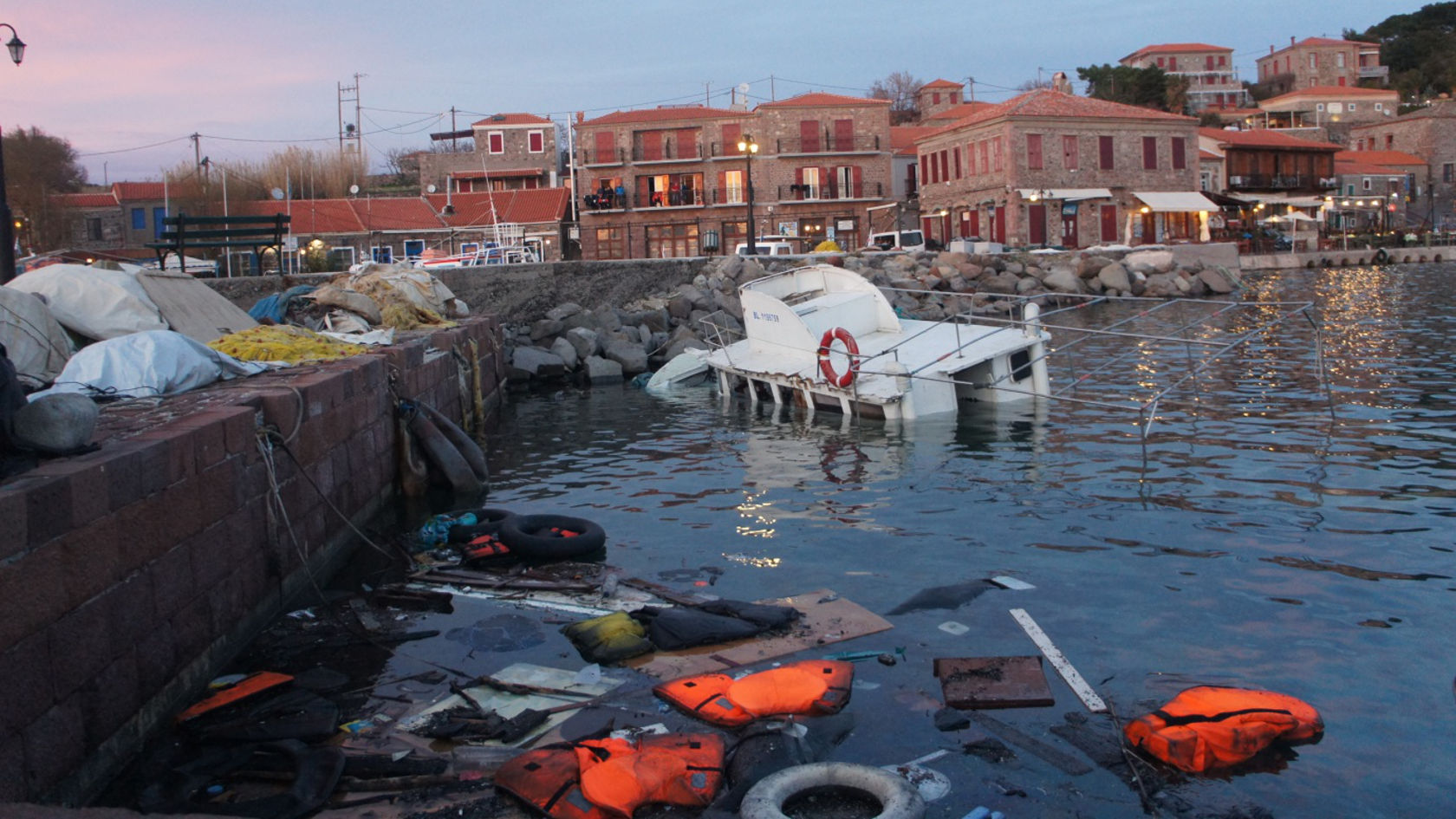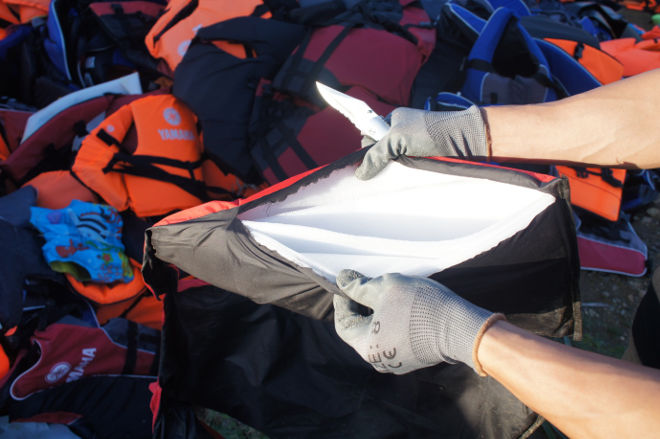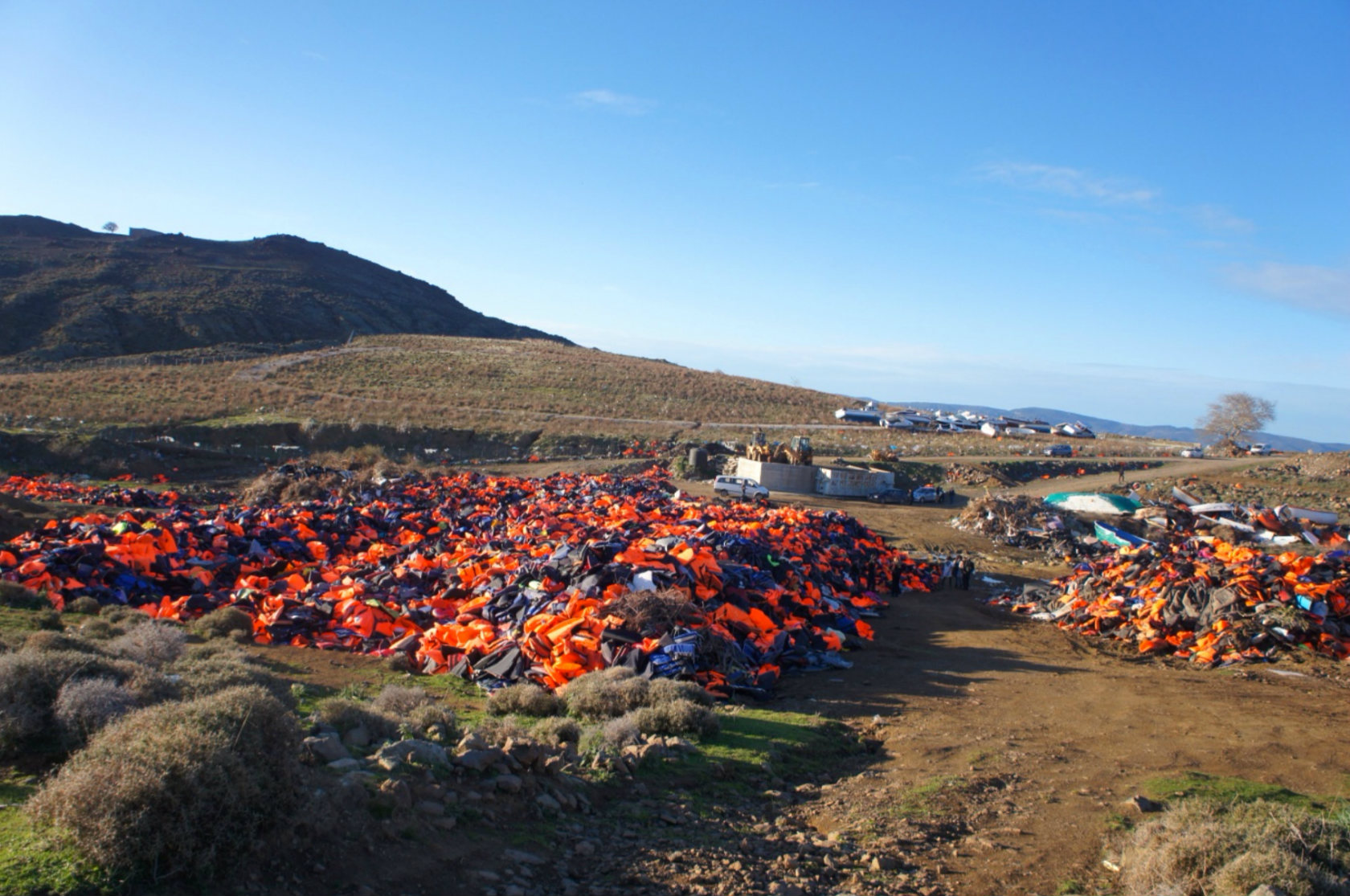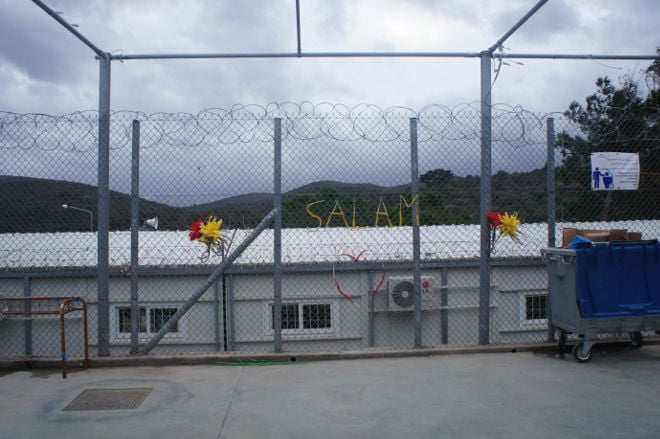The first time I see a boat being towed into Lesvos, Greece, the gravity of the refugee crisis hits me.
Saved in the middle of the Aegean Sea by the Hellenic Coast Guard, the passengers had been huddled on two red inflatable lifeboats because the derelict dinghy they had left Turkey with had filled up to the thighs with water.
When they reached the shores of Petra port, they tear off their life jackets and rush onto land, completely soaked and shaking. Half of them, including many children, are immediately treated for hypothermia by Doctors Without Borders. The others frantically ask one question over and over to the translators waiting for them: “Have we made it?”
The narrative being sold in Australia is that the refugee problem is over now the government has “stopped the boats”. In this narrative, it’s justifiable that 1,469 asylum seekers are effectively having their lives ruined by being locked up indefinitely on offshore detention centres because it’s prevented people from boarding boats and risk drowning at sea, and crushed the people-smuggler trade plying the route from Indonesia to Christmas Island.
However, since 2015, over a million refugees predominately from Syria, Iraq and Afghanistan have crossed through to Europe by boat, marking the world’s biggest refugee crisis since World War Two. To understand the weight of this issue, I had gone to both Greece and Turkey to volunteer and witness first-hand just how complex, unfair, ineffectual and deadset wrong Australia’s approach to asylum seeker policy is.
In many ways, the challenges Greece currently faces in its policy towards refugees parallels those of Australia in 2013, when Kevin Rudd announced that no asylum seekers coming to Australia by boat would be resettled. At the time, the death of around 1,000 asylum seekers at sea prompted Rudd to declare that people smugglers were “peddling in misery and death”. Since the European migrant crisis emerged, around 732 asylum seekers have drowned in the Aegean Sea in attempts to reach Greece, including five-year-old boy Alan Kurdi.
“Two weeks ago, I had to drive to parents from Moria to Mytellini to reunite them with the body of their child,” David Ang, the Harbours Operation Manager of refugee aid group Starfish Foundation tells me. “I’ll never forget that day in my life. It was a horrible day. They were inconsolable. The whole family broke down. It was a mixture of shock, horror, anger — it was everything rolled into one — it was explosive.”
In large part, these deaths have been caused by smuggling operations. This became clear to me on my first day in Lesvos when I am taken to ‘Lifejacket Bay’ — a waste site five minutes drive up from the port of Molyvos.
Here, thousands of lifejackets, broken boats and punctured inflatable rafts have been discarded. Lined in five rows, lifejackets are piled on top of each other, towering over my head. Walking through the muddy path between each row feels surreal, as if you’re at a gravesite. David slices a few of the lifejackets, and inside we find materials that don’t float: packaging material, Styrofoam. One lifejacket is filled with grass.
“Here’s how it works: smugglers gather over 30 refugees. They overload them onto incredibly unreliable boats never meant to be at sea — cracked, inflatable, can’t take the weight of so many people,” David says. “They fill the engines will just a little bit of fuel, which doesn’t get the boats very far so they tend to drift on waves and they’re left at the mercy of the waves. The last person to get on the boat is deemed the captain — they have no idea where they are going.”
When I talk to Hazar, a Syrian refugee who had made it to Lesvos, he tells me that asylum seekers pay smugglers from $1,000 – $2,500USD apiece to take a boat from Turkey. This price varies. Wooden boats are more expensive compared to inflatable ones. During the winter, where seas are more turbulent, there is such a thing as a ‘bad weather discount’. Some smugglers offer an ‘extra service fee’, promising that they’ve arranged accommodation, food and shuttle buses for when the asylum seekers reach Greece. This is of course, a lie — all the camps organised in Greece are run by volunteers and NGOs.
“Smugglers exist because wars exist. Refugees will always be desperate for sanctuary, for lives. Smugglers will take advantage of this — some think they’re doing the right thing,” George* (not his real name) says. George has been working for the Hellenic Coast Guard for more than four years.
Tall and well spoken, he tells me about the hundreds of refugee boats he’s rescued in the Aegean Sea since the crisis started — traumatised children, screaming people who cannot swim, collecting trails of drowned bodies. He also speaks of the relief he feels when his team reaches a boat just in time, moments before it goes under.
Coast guarding has been an essential element in saving refugee lives. In Lesvos, the Hellenic Coast Guard work closely with Frontex, European Union’s border control agency, and the Turkish Coast Guard to ensure that no drownings occur at sea. Depending in which territorial waters boats are picked up, asylum seekers are safely towed back to shore. This has effectively saved over 90,000 lives.
It’s an approach that greatly juxtaposes with Australia’s. Under Operation Sovereign Borders, boats are intercepted by the navy and towed back, unsafely left on the edge of Indonesian waters to navigate themselves back to shore. In 2015, this lead to 65 asylum seekers crashing onto a reef off West Timor after being intercepted, transferred to another boat and taken back to Indonesian waters by Australian authorities. If they are not towed back, asylum seekers are put on Nauru, Christmas Island or Manus Island indefinitely.
When I tell George this, he shakes his head angrily.
“You know,” he says, “your and my government spend millions and millions of dollars trying to stop smuggling, stop refugees taking boats, stop deaths at sea. But all of this could be so stopped if governments just provided a safe passageway.”
Instead of safe passageway, the EU has recently announced that it would return any asylum seekers who come by boat to Greece back to Turkey to stem the influx of asylum seekers engaging in smugglers. However, this move has been criticised for contravening international law, leaving asylum seekers in purgatory and being ineffectual in stopping the smuggler trade.
Part of the narrative perpetuated by the Australian government is that there is an official “queue” where refugees registered with the UNHCR are given comfortable aid, sit tight and just wait to be resettled.
However, in Lesvos I learn just how untrue this narrative is. What became quickly clear is that the so-called ‘co-ordinated’ relief effort for the crisis is not co-ordinated at all. In fact, the relief to this crisis has overwhelmingly been improvised, relying heavily on the altruism of grassroots volunteer organisations, many of which are only eight to ten months old and still attempting to reach economies of scale.
It’s something that becomes even clearer when I reach Moria, the official registration camp for refugees in Lesvos. Surrounded by barbed wire and patrolled by police, I notice the UNHCR tent has less manpower and equal authority to the five other grassroots volunteer organisations running the camp. This is not only because the UNHCR are on the verge of bankruptcy, but also because a lack of co-operation from local and national authorities restricts its jurisdiction and funding.
Moria does not do resettlement. It mainly acts as a transitory camp, where refugees stay for a night or two before spending their own money to take a boat to mainland Greece to find camps that may resettle them, or make their way to the Macedonian border for better chances of resettlement further north. Due to government’s unwillingness to properly settle refugees, this state of flux and uncertainty is constant.
Aryushi*, a Syrian mother with four kids from Tell Tamer, a contested town currently controlled by ISIL and rampant with abductions and military offensives, wearily explains her journey to me.
“We go to one safer [Syrian] town, the soldiers follow. We go to another, the soldiers follow. So we go to Turkey, to a camp. They tell us to register and we do. But there are too many of us, so we are sent to another camp [along the border]. Then another, but there are so many [crossing the border]. Finally, we ask them, what now? They tell us to go the city. We go to Ankara and Istanbul, but we don’t know the language. We don’t know who to go to. We cannot get job permits. There is no employment. Nothing. How can I support my family? How can I have a life? So we left.”
Drawings from a Syrian child on Lesvos, done without prompting, during playtime.
As it stands, countries of less infrastructure and capability are taking on more refugees than they can handle compared to richer nations like Australia. These poorer countries are either unable or unwilling to provide proper social facilities – such as housing, vocational training, work permits, language classes and access to health services – that allow refugees to build a life after fleeing and integrate themselves into a new community. It’s this factor that pushes refugees like Ayrushi to take smuggler boats.
Turkey is a prime example of this. Bordering Syria, the country has 2,291,900 registered asylum seekers as of December 2015, with only around 11 percent living in resettlement camps. Giving asylum seekers access to working permits is limited, especially due to the fact that Turkey has an unemployment rate of 10.8 percent. In fact, it wasn’t until January this year that Syrians were able to register for working permits. However, this still leaves millions of non-Syrian asylum seekers at a loss.
Ali, a refugee who fled Afghanistan, explains to me the difficulty of having a life in Turkey. “We were on the streets a lot because Turkey is expensive and we had all our money stolen from us. No one would give us jobs so, at some points, we had to beg.”
Like Greece, relief and temporary assistance is ad hoc in Turkey. In the country’s west assistance is, again, mainly run by volunteer groups — funding and official UNHCR camps are focused on the eastern part of Turkey along the Syrian border. Turkey has had three ISIS suicide bombs in the past six months, one of which was only three days ago. It leaves little hope for security or life for refugees.
After my time in Lesvos, I go to Cesme, a coastal town in Turkey that many asylum seekers stay in before being smuggled out to sea. As I head into town, I see a few refugees camped out in parks.
Small local businesses have been stepping in to provide housing and food, which has come at a cost to their livelihoods. Aynur is a hotel owner who’s housing over 14 asylum seekers. Each of them pays a discounted price of 19 Turkish Lira ($9AUD) per night. She tells me that when the Turkish Coast Guard captures asylum seeker boats and takes them back to Turkey, they are left to fend for themselves. Often they show up at her hotel dripping wet, dejected. There’s a definitive resentment in her tone when she speaks of Europe and other western nations in their part of dealing with this crisis.
“[Europe] puts us in such a tough situation. On one hand they tell us to open the borders up to the Syrians, that it is wrong if we close it up to people in war. But then they tell us to get rid of the smugglers and stop letting them come into Europe. We can’t handle this. This isn’t fair. Everyone needs to do more!”
Later, she introduces me to two Afghani women who were captured by the Turkish Coast Guard attempting to leave Cesme by boat the night before. As a mother and a sister, both women have no men in their lives, no work experience and know little Turkish. Aynur tells me they are staying for free. When I find out they’re going to try to cross the Aegean to Greece one more time, I have Aynur ask them why. Without hesitation, the mother points at her son, and there is no translation I need for that.
Australia is greatly removed from the current refugee crisis, not only geographically but politically. Our government has ensured that we know or encounter as little as possible of the complexity of the issue. We’ve been gift-wrapped a neat little fable that our borders are secure because the boats have stopped coming. The more we wave this ignorant banner, the more we close our eyes to the refugee crisis that is draining the rest of the world.
–
Carrie Hou is a Law/Media student from Sydney who is currently travelling around Europe.



